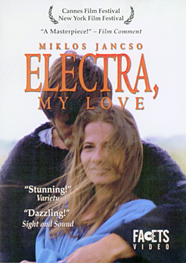
<a> IMDB</a>
<a>Otrocampo</a>
<a>Kinoeye</a>
Szerelmen, Electra
[Electra, my love]
Hungría, 1974.
Dirección: Miklós Jancsó.
Intérpretes: Mari Töröcsik (Electra),
György Cserhalmi (Orestes), József Madaras (Egisto),
Lajos Balazsovits (cortesano), Tamás Cseh (juglar)
Guión:
Gyula Hernádi
(según obra teatral homónima de Laszlo Gyurkó.)
Fotografía: János Kende.
Montaje: Zoltán Farkas.
Música original: Tamás Cseh, Béla Vavrinecz
Música: Béla Bartok.
Sonido: György Pintér.
Diseño de producción: Tamás Banovich.
Vestuario: Zsuzsa Vicze.
Asistente del director: Dezsó Kozar.
Producción: József Bajuzs.
[quote]
SINOPSIS:
Electra (Mari Töröcsik) is considered mad because she mourns the loss of her father, Agamemnon, and roams the countryside accusing the new king Aegisthus of murder. She constantly claims that her brother Orestes will return to right the injustice and expel the usurper who rules the country with an iron fist. A messenger brings word that Orestes is dead, but soon thereafter he appears, to do exactly what the 'mad' Electra has foretold.
Electra moves along a line of wispily-attired maidens, telling of the injustice of the king. Behind, ranks of cavalrymen move on horseback. Sweeping left, we move down a diagonal line of men cracking long black whips in unison. Electra re-enters and circles a statue-like grouping of nudes. Musicians re-direct our gaze off to the left, until dancing people appear on cue over a small hill.
There are cuts in Electra, My Love, but almost all of the story is composed of these pageant-like master shots, each of which must have been rehearsed like dance theater for days, before being filmed. The camera stays more or less at eye-level, and avoids extreme motions. It glides calmly, finding new compositions in the constantly-changing patterns of people and props.
It is very much like a Greek play, with minimalist costumes (the nudity is frequent, but aesthetically asexual) and characters who strike poses and speak their lines directly to the camera. The visuals are impressive, but the story is hard to follow. Electra complains, the bad king threatens but doesn't kill her, a messenger brings bad news and is murdered, and then the lost brother Orestes appears. He looks exactly like the messenger (?) and somehow takes back the kingdom. It doesn't seem to follow the usual events laid out in old accounts, with the involvement of Electra's mother Clytaemnestra, and sister Iphegenia. After the 'revolution', the story ends, but the celebratory pagentry continues. Mourning becomes Electra, but she smiles a lot in the last reel or so.
Some scenes are totally opaque, and we just enjoy the constantly-changing visual patterns. Others, as when the king's subjects are told to criticize him, yet offer up only sycophantic praise, are easy to understand. (spoiler) The ending is simply strange, when a red helicopter picks up the newly-reunited brother and sister, flies around, and brings them back to Earth once more. Is Electra's revenge on her usurpers a fantasy? Is the story taking place in her fevered mind? This is an art film that has more to do with the graphic manipulation of living scenery and the convoluted permutations of patterns in movement - a combination of dance and camerawork. It really can't be appreciated much as a story.
Glenn Erickson[/quote]




Código: Seleccionar todo
Total Streams: 2
Running Time: 1:11:32
Index Chunk: Yes
Interleaved: Yes
Max Bytes Per Sec: 0
AUDIO: 0 - MP3 (0x55)
Average Bitrate Per Sec: 190 kb/s
Samples Rate: 48000 Hz
Channels: 2
Bits Per Sample: 0
SuggestedBufferSize: 768
Sample Size: 0
Variable Bitrate: Yes (128, 192, 224)
VIDEO: XVID
B-VOP: Yes
S(GMC)-VOP: No
QuarterPixel: No
Frame Size: 320 x 240
Frames Rate: 29.970
Color Depth: 12
Total Frames: 128650
SuggestedBufferSize: 40210
Subtítulos en español (gracias a Canaguayo):
Saludos